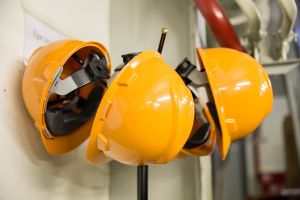Difference between revisions of "CE Marking of Personal Protective Equipment"
(Created page with "thumb|Personal protective equipment (PPE) are products that the user can wear or hold, to be protected against risks either at work, at home or whilst engaging in leisure activities. Statistics on fatal and major work accidents underline the importance of protection and prevention, for which personal protective equipment plays an important role. '''Personal protective equipment''' (PPE) affords the user protection from hazards encountered at work,...") |
(No difference)
|
Revision as of 23:02, 14 March 2022

Personal protective equipment (PPE) affords the user protection from hazards encountered at work, at home or during leisure activities. In the professional context, they are instruments for achieving what the EU considers a fundamental right, that of health and safety in the workplace.
European Union policy with regard to PPE is aimed to define the basic health and safety requirements to be fulfilled by manufacturers and remove barriers to trade in these products within the internal market. The presence of the CE marking on PPE is an indication that it meets these harmonised requirements and can be sold anywhere in the European Economic Area (made up of the EU countries plus Norway, Iceland and Liechtenstein) as well as in Turkey. This also applies to products manufactured in third countries.
The PPE Directive makes a distinction between PPE of "simple design", "complex design" and neither of these, the last being the third Category.
The manufacturer (or his authorised representative established in the EU) has the obligation to put together technical documentation regardless the category of PPE.
To confirm that PPE of simple design complies with the safety requirements of the Directive, the manufacturer is required to complete the EC Declaration of Conformity only.
For PPE of categories II, III, a two-stage conformity assessment procedure must be followed. Firstly, the PPE must undergo the EC type-examination, which is carried out by a Notified Body. Secondly, the manufacturer must choose between either the "EC quality control system for the final product", or the "system for ensuring EC quality of production by means of monitoring".
Once the appropriate certification process has been completed, the manufacturer (or his authorised representative in the EU) must affix the CE marking to the PPE. If for practical reasons the marking cannot be affixed to the PPE itself, it can appear on the packaging. Where appropriate, the CE marking must be accompanied by the identification number of the Notified Body involved in the conformity assessment process.
The CE marking must be "visible, legible and indelible" throughout the expected life of the PPE.
(sources: European Commission, Directorate-General for Enterprise and Industry, CE marking for personal protective equipment (PPE), European Commission, 2014, https://data.europa.eu/doi/10.2769/66112 , https://ec.europa.eu/growth/sectors/mechanical-engineering/personal-protective-equipment-ppe_en)
Not just PPE Directive...
In general, CE Marking of PPE does not mean to apply PPE Directive.
In fact, many situation can arises, where more Directives have to be applied, and there are also exceptions where PPE Directive has not to be applied for the CE Marking of PPE. Also for this reason, the best option for a manufacturer is to ask the support of a CE Marking expert, who can also help you to:
- identify and apply harmonised standards, if applicable
- evaluate the necessity or usefulness of laboratory test and choose the best laboratory for your specific case
- prepare the Technical File for CE Marking, including also: Risk Analysis, Product Manuals, etc.
Do you need help for CE Marking?
How we help manufacturers, distributors and importers:
We offer consulting on CE marking to manufacturers, distributors and importers. This also includes:
- identification of the obligations for your specific products
- technical support in preparing the necessary documentation
- consultancy for the identification and implementation of safety measures (e.g.: selection of safe materials and components, design changes for safety, addition of protections, photocells and interlocks, safety operating procedures, personal protection equipment, affixing written warnings and pictograms, etc.).
How we help customers:
In addition to indirectly helping consumers by offering advice to manufacturers to market safe products, we provide support to consumers by providing them with information about the meaning of the CE marking and useful advice on how to choose compliant and therefore safer products.